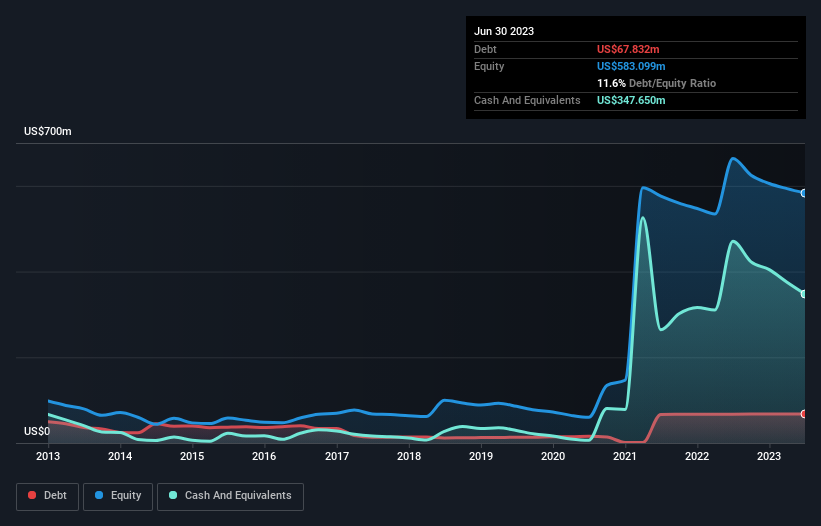Some say volatility, rather than debt, is the best way to think about risk as an investor, but Warren Buffett famously said that 'Volatility is far from synonymous with risk.' So it seems the smart money knows that debt - which is usually involved in bankruptcies - is a very important factor, when you assess how risky a company is. We can see that Gevo, Inc. (NASDAQ:GEVO) does use debt in its business. But should shareholders be worried about its use of debt?
When Is Debt Dangerous?
Debt assists a business until the business has trouble paying it off, either with new capital or with free cash flow. Part and parcel of capitalism is the process of 'creative destruction' where failed businesses are mercilessly liquidated by their bankers. However, a more usual (but still expensive) situation is where a company must dilute shareholders at a cheap share price simply to get debt under control. By replacing dilution, though, debt can be an extremely good tool for businesses that need capital to invest in growth at high rates of return. The first thing to do when considering how much debt a business uses is to look at its cash and debt together.
View our latest analysis for Gevo
How Much Debt Does Gevo Carry?
As you can see below, Gevo had US$67.8m of debt, at June 2023, which is about the same as the year before. You can click the chart for greater detail. However, it does have US$347.7m in cash offsetting this, leading to net cash of US$279.8m.

A Look At Gevo's Liabilities
According to the last reported balance sheet, Gevo had liabilities of US$89.6m due within 12 months, and liabilities of US$1.87m due beyond 12 months. Offsetting these obligations, it had cash of US$347.7m as well as receivables valued at US$2.43m due within 12 months. So it can boast US$258.6m more liquid assets than total liabilities.
This luscious liquidity implies that Gevo's balance sheet is sturdy like a giant sequoia tree. Having regard to this fact, we think its balance sheet is as strong as an ox. Succinctly put, Gevo boasts net cash, so it's fair to say it does not have a heavy debt load! There's no doubt that we learn most about debt from the balance sheet. But ultimately the future profitability of the business will decide if Gevo can strengthen its balance sheet over time. So if you want to see what the professionals think, you might find this free report on analyst profit forecasts to be interesting.
In the last year Gevo wasn't profitable at an EBIT level, but managed to grow its revenue by 1,749%, to US$9.2m. That's virtually the hole-in-one of revenue growth!
So How Risky Is Gevo?
By their very nature companies that are losing money are more risky than those with a long history of profitability. And in the last year Gevo had an earnings before interest and tax (EBIT) loss, truth be told. And over the same period it saw negative free cash outflow of US$124m and booked a US$101m accounting loss. With only US$279.8m on the balance sheet, it would appear that its going to need to raise capital again soon. Importantly, Gevo's revenue growth is hot to trot. While unprofitable companies can be risky, they can also grow hard and fast in those pre-profit years. The balance sheet is clearly the area to focus on when you are analysing debt. But ultimately, every company can contain risks that exist outside of the balance sheet. These risks can be hard to spot. Every company has them, and we've spotted 2 warning signs for Gevo you should know about.
If, after all that, you're more interested in a fast growing company with a rock-solid balance sheet, then check out our list of net cash growth stocks without delay.
New: Manage All Your Stock Portfolios in One Place
We've created the ultimate portfolio companion for stock investors, and it's free.
• Connect an unlimited number of Portfolios and see your total in one currency
• Be alerted to new Warning Signs or Risks via email or mobile
• Track the Fair Value of your stocks
Have feedback on this article? Concerned about the content? Get in touch with us directly. Alternatively, email editorial-team (at) simplywallst.com.
This article by Simply Wall St is general in nature. We provide commentary based on historical data and analyst forecasts only using an unbiased methodology and our articles are not intended to be financial advice. It does not constitute a recommendation to buy or sell any stock, and does not take account of your objectives, or your financial situation. We aim to bring you long-term focused analysis driven by fundamental data. Note that our analysis may not factor in the latest price-sensitive company announcements or qualitative material. Simply Wall St has no position in any stocks mentioned.
About NasdaqCM:GEVO
Slight risk with mediocre balance sheet.
Similar Companies
Market Insights
Community Narratives



